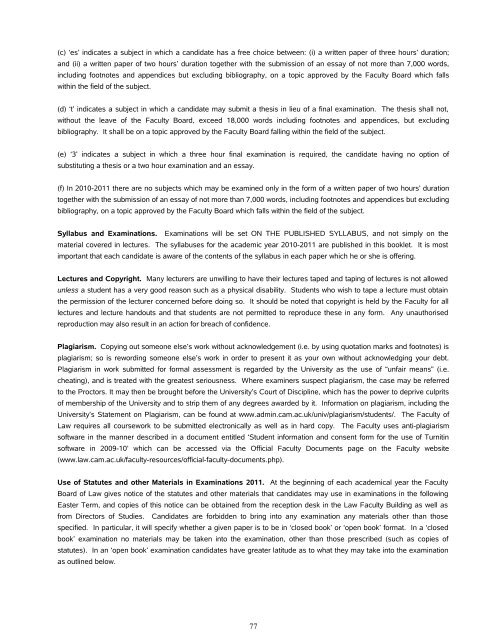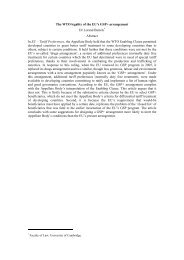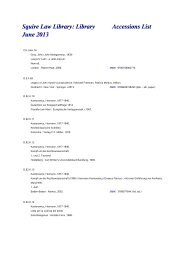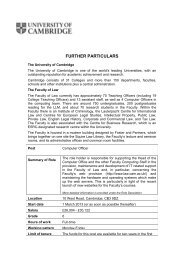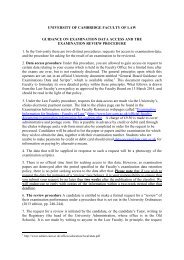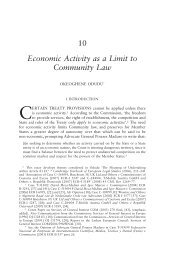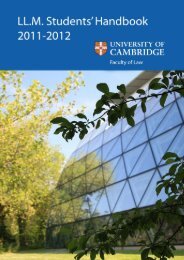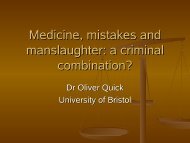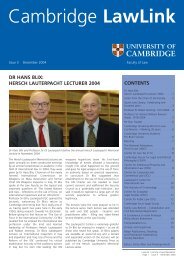Contents - Faculty of Law - University of Cambridge
Contents - Faculty of Law - University of Cambridge
Contents - Faculty of Law - University of Cambridge
You also want an ePaper? Increase the reach of your titles
YUMPU automatically turns print PDFs into web optimized ePapers that Google loves.
(c) ‘es’ indicates a subject in which a candidate has a free choice between: (i) a written paper <strong>of</strong> three hours’ duration;and (ii) a written paper <strong>of</strong> two hours’ duration together with the submission <strong>of</strong> an essay <strong>of</strong> not more than 7,000 words,including footnotes and appendices but excluding bibliography, on a topic approved by the <strong>Faculty</strong> Board which fallswithin the field <strong>of</strong> the subject.(d) ‘t’ indicates a subject in which a candidate may submit a thesis in lieu <strong>of</strong> a final examination. The thesis shall not,without the leave <strong>of</strong> the <strong>Faculty</strong> Board, exceed 18,000 words including footnotes and appendices, but excludingbibliography. It shall be on a topic approved by the <strong>Faculty</strong> Board falling within the field <strong>of</strong> the subject.(e) ‘3’ indicates a subject in which a three hour final examination is required, the candidate having no option <strong>of</strong>substituting a thesis or a two hour examination and an essay.(f) In 2010-2011 there are no subjects which may be examined only in the form <strong>of</strong> a written paper <strong>of</strong> two hours’ durationtogether with the submission <strong>of</strong> an essay <strong>of</strong> not more than 7,000 words, including footnotes and appendices but excludingbibliography, on a topic approved by the <strong>Faculty</strong> Board which falls within the field <strong>of</strong> the subject.Syllabus and Examinations. Examinations will be set ON THE PUBLISHED SYLLABUS, and not simply on thematerial covered in lectures. The syllabuses for the academic year 2010-2011 are published in this booklet. It is mostimportant that each candidate is aware <strong>of</strong> the contents <strong>of</strong> the syllabus in each paper which he or she is <strong>of</strong>fering.Lectures and Copyright. Many lecturers are unwilling to have their lectures taped and taping <strong>of</strong> lectures is not allowedunless a student has a very good reason such as a physical disability. Students who wish to tape a lecture must obtainthe permission <strong>of</strong> the lecturer concerned before doing so. It should be noted that copyright is held by the <strong>Faculty</strong> for alllectures and lecture handouts and that students are not permitted to reproduce these in any form. Any unauthorisedreproduction may also result in an action for breach <strong>of</strong> confidence.Plagiarism. Copying out someone else’s work without acknowledgement (i.e. by using quotation marks and footnotes) isplagiarism; so is rewording someone else’s work in order to present it as your own without acknowledging your debt.Plagiarism in work submitted for formal assessment is regarded by the <strong>University</strong> as the use <strong>of</strong> “unfair means” (i.e.cheating), and is treated with the greatest seriousness. Where examiners suspect plagiarism, the case may be referredto the Proctors. It may then be brought before the <strong>University</strong>’s Court <strong>of</strong> Discipline, which has the power to deprive culprits<strong>of</strong> membership <strong>of</strong> the <strong>University</strong> and to strip them <strong>of</strong> any degrees awarded by it. Information on plagiarism, including the<strong>University</strong>’s Statement on Plagiarism, can be found at www.admin.cam.ac.uk/univ/plagiarism/students/. The <strong>Faculty</strong> <strong>of</strong><strong>Law</strong> requires all coursework to be submitted electronically as well as in hard copy. The <strong>Faculty</strong> uses anti-plagiarisms<strong>of</strong>tware in the manner described in a document entitled ‘Student information and consent form for the use <strong>of</strong> Turnitins<strong>of</strong>tware in 2009-10’ which can be accessed via the Official <strong>Faculty</strong> Documents page on the <strong>Faculty</strong> website(www.law.cam.ac.uk/faculty-resources/<strong>of</strong>ficial-faculty-documents.php).Use <strong>of</strong> Statutes and other Materials in Examinations 2011. At the beginning <strong>of</strong> each academical year the <strong>Faculty</strong>Board <strong>of</strong> <strong>Law</strong> gives notice <strong>of</strong> the statutes and other materials that candidates may use in examinations in the followingEaster Term, and copies <strong>of</strong> this notice can be obtained from the reception desk in the <strong>Law</strong> <strong>Faculty</strong> Building as well asfrom Directors <strong>of</strong> Studies. Candidates are forbidden to bring into any examination any materials other than thosespecified. In particular, it will specify whether a given paper is to be in ‘closed book’ or ‘open book’ format. In a ‘closedbook’ examination no materials may be taken into the examination, other than those prescribed (such as copies <strong>of</strong>statutes). In an ‘open book’ examination candidates have greater latitude as to what they may take into the examinationas outlined below.77


